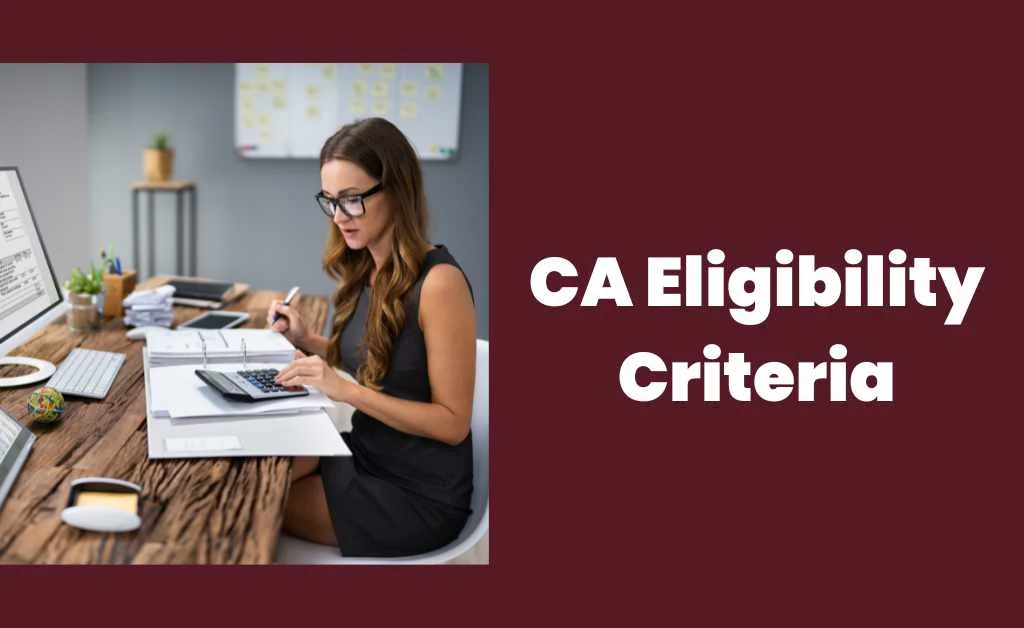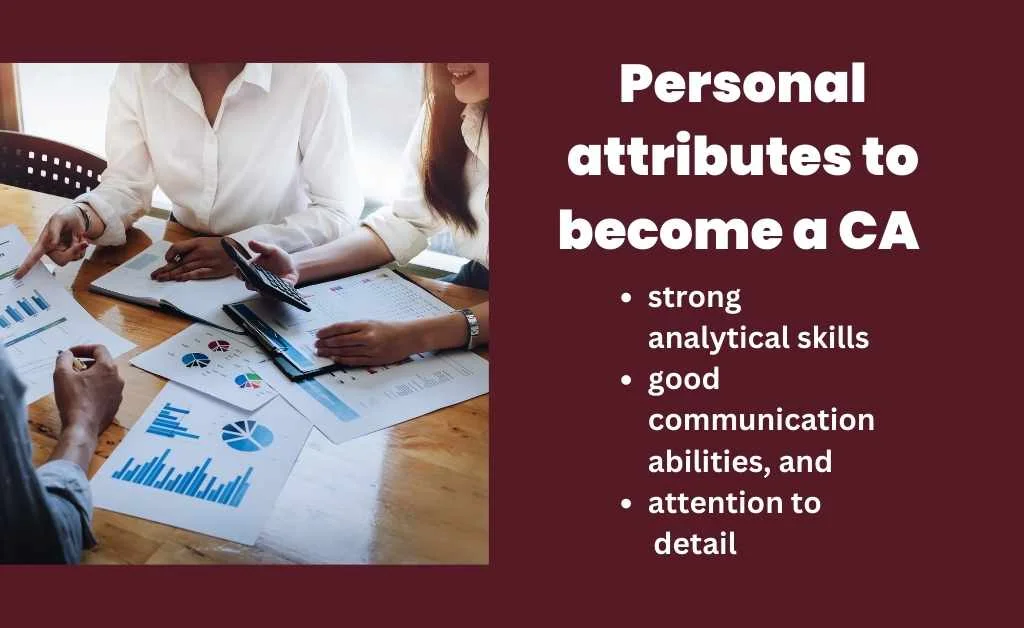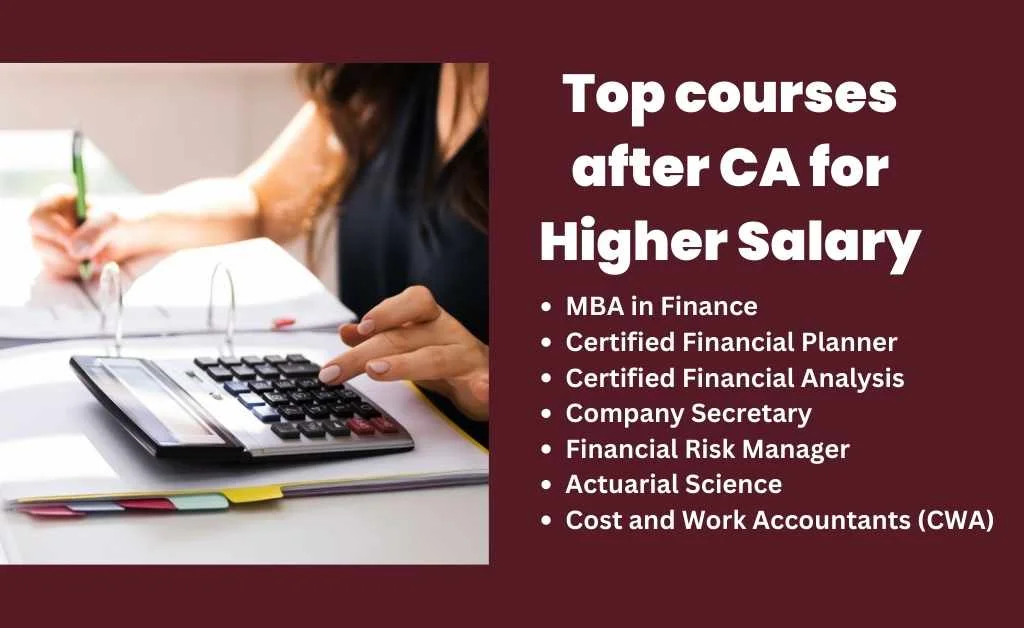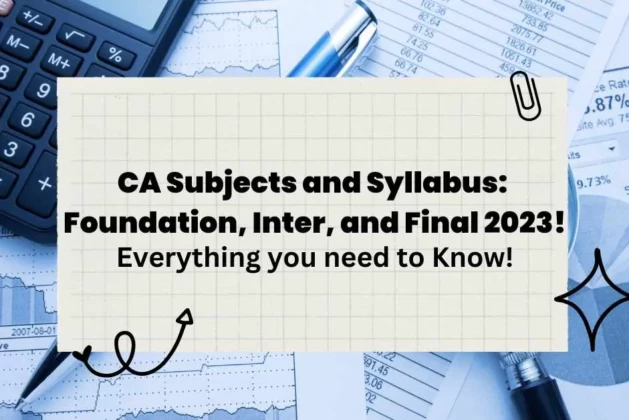Table of Contents
ToggleIntroduction
The Chartered Accountant Course is a challenging yet rewarding path for those interested in pursuing a career in accounting and finance. With the vast CA syllabus and rigorous exams, it requires hard work, dedication, and discipline. However, with the right study resources, equipment, and preparation strategy coupled with effective time management skills, you can be successful.
Each subject has its own unique set of challenges so it’s important to approach each one with patience and focus. Following the tips we’ve outlined above such as using past papers to practice writing style questions or studying regularly without procrastinating will help you achieve your goals in this profession.
With proper planning and execution of studying techniques, you can be on your way to a successful career in accounting and finance.
Also read: CA vs CFA
What is Chartered Accountant?
Chartered Accountant (CA) is a professional course that focuses on finance and accounting. The Institute of Chartered Accountants of India (ICAI) conducts this course for students who want to pursue a career in commerce and accounts. To become one, you have to clear three levels: Foundation, Intermediate, and Final.
Each level has different subjects that focus on various aspects of finance and accounting such as taxation, auditing, corporate laws, financial reporting, etc. The profession is highly respected in India and offers excellent job opportunities with high salary packages in various sectors like Banking, Auditing firms, and Stock markets among others. However, becoming a CA requires hard work and dedication because the exams are tough and require much hard work and perseverance.
CA Eligibility Criteria

To become a Chartered Accountant in India, one must meet certain eligibility criteria. Firstly, the candidate should have completed their 10+2 education from a recognized board or institution.
After that, they need to enroll for the Foundation Course and clear it to move on to the next level of studies – CA Intermediate. Candidates must additionally complete four months of practical training under the supervision of a practicing Chartered Accountant.
In addition to meeting these educational requirements, some personal attributes to become a Chartered Accountant.

Becoming a CA requires dedication and hard work both academically and practically. However, those who choose this career path can look forward to excellent job prospects as well as opportunities for growth within the field of accounting and finance.
Must read: CA course duration
CA Syllabus
The Chartered Accountancy program is known to have a vast syllabus covering various subjects.
The syllabus is divided into three levels- Foundation, Intermediate, and Final, each level building on top of its predecessor. The Foundation Level focuses on laying down basic concepts while Intermediate Level strengthens these concepts through practical applications. The Final Level prepares students to become competent professionals in their respective fields of specialization.
Apart from core subjects like Accounting, Economics, and Law, other important areas like Auditing & Assurance, Financial Management & Analysis are also covered under this program’s vast syllabus. This comprehensive coverage of different aspects of finance and accounting and an emphasis on ethics in business practices make the aspirants well-rounded professionals prepared for future challenges.
Mastering every aspect included in this extensive curriculum can set aspiring Chartered Accountants apart from others by providing them with valuable insights into complex financial issues they may face during their career journey ahead.
CA Foundation Syllabus
|
Paper 1: Principles and Practice of Accounting |
Paper 2: Business Correspondence and Reporting & Business Laws |
|
Theoretical Framework |
Section A |
|
The Sale of Goods Act, 1930 |
|
|
Accounting Process |
The Indian Contract Act, 1872 |
|
Inventories |
The Indian Partnership Act, 1932 |
|
Concept and Accounting of Depreciation |
The Limited Liability Partnership Act, 2008 |
|
Accounting for Special Transactions |
The Companies Act, 2013 |
|
Final Accounts of Sole Proprietors |
Section B |
|
Partnership Accounts |
Business Correspondence and Reporting |
|
Financial Statements of Not-for-Profit Organizations |
Communication |
|
Introduction to Company Accounts |
Sentence Types |
|
– |
Vocabulary Root Words, Synonyms, Antonyms, Prefixes, Suffixes |
|
– |
Comprehension of Passages, Note Making, Article Writing, Writing Formal Emails |
|
– |
Introduction to basic writing, Resume Writing Meetings |
|
Paper 3: Logical Reasoning, Business Mathematics & Statistics |
Paper 4: Business and Commercial Knowledge & Business Economics |
|
Part A: Business Mathematics |
Part A – Business Economics |
|
Ratio and Proportion, Indices, and Logarithms |
Introduction to Business Economics |
|
Equations and Matrices |
Theory of Demand and Supply |
|
Linear Inequalities with Objective Functions and Optimization w.r.t. objective function |
Theory of Production and Cost |
|
Time Value of Money |
Price Determination in Different Markets |
|
Permutations and Combinations |
Business Cycles |
|
Sequence and Series |
– |
|
Sets, Relations, and Functions |
– |
|
Basic Applications of Differential and Integral Calculus |
– |
|
Part B: Logical Reasoning |
Part B- Business and Commercial Knowledge |
|
Coding and decoding, number sequence, and the odd one out. |
Business and Commercial Knowledge – An Introduction |
|
Direction Tests |
Organizations Facilitating Business |
|
Seating Arrangements |
Common Business Terminologies |
|
Blood Relations |
Business Organizations |
|
Syllogism |
Business Environment |
|
– |
Government Policies for Business Growth |
|
Part C: Statistics |
|
|
Statistical Description of Data |
– |
|
Measures of Central Tendency and Dispersion |
– |
|
Probability |
– |
|
Theoretical Distributions |
– |
|
Correlation and Regression |
– |
|
Index Numbers and Time Series |
– |
The syllabus consists of four papers:
- Principles and Practices of Accounting
- Business Laws and Business Correspondence & Reporting
- Business Mathematics and Logical Reasoning & Statistics
- Economics for Finance
Each paper carries 100 marks
The Foundation Syllabus provides a strong foundation for aspiring chartered accountants by covering all essential aspects that will be further developed at higher levels.
CA Intermediate Syllabus
|
Group 1 |
Group 2 |
|
1: Accounting |
5: Advanced Accounting |
|
2: Corporate and Other Laws |
6: Auditing and Assurance |
|
3: Cost and Management Accounting |
7: Strategic Management and Enterprise Information Systems |
|
4: Taxation |
8: Financial Management & Finance Economics |
The second level of the Chartered Accountancy program is the CA Intermediate course. This level’s curriculum is divided into two groups, each of which consists of four topics.
CA Final Syllabus
The Final exam is the last and most challenging stage of becoming a Chartered Accountant. This exam is designed to test your knowledge, skills, and expertise in various aspects of accounting, taxation, auditing, financial management, corporate laws, and ethics.
In order to prepare for this exam, you need to have a thorough understanding of all eight subjects that are included in the syllabus:
- Financial Reporting
- Strategic Financial Management
- Advanced Auditing & Professional Ethics
- Corporate Laws & Other Economic Laws
- Strategic Cost Management & Performance Evaluation
- Elective Paper
- 6A: Risk Management
- 6B: Financial Services and Capital Markets
- 6C: International Taxation
- 6D: Economic Laws
- 6E: Global Financial Reporting Standards
- 6F: Multi-disciplinary Case Study
- Direct Tax Laws and International Taxation
Part I: Direct Tax Laws
Part II: International Taxation
- Indirect Tax Laws
Part I: Goods and Services Tax
Part II: Customs and FTP
Top Courses after CA for Higher Salary
Without any doubt, there are a lot of career opportunities in your hands but there are some courses that add value to your degree even more. Here are some of them:

- MBA in Finance
- Certified Financial Planner
- Certified Financial Analysis
- Company Secretary
- Financial Risk Manager
- Actuarial Science
- Cost and Work Accountants (CWA)
Top 10 CA Firms in India
The Laborious journey you undertook to become a Chartered Accountant is a seed sown at an early stage that gives you fruitful results in the future in the form of high-paying jobs. A lot of top-ranked companies hire for the positions of Chartered Accountants in India. Below are a few organizations that pay well and also provide good career opportunities to CAs:
- KPMG
- Grant Thornton
- Kotak Mahindra
- Deloitte
- ICICI Bank
- Aditya Birla Group
- Indian Oil
- EY
- Reliance Industries
- Accenture
Must read: ACCA salary in India
Conclusion
As we come to the end of this blog about Chartered Accountancy subjects and the syllabus for 2023, it’s important to remember that becoming a Chartered Accountant requires hard work, dedication, and commitment. The course is not an easy one but with the right mindset and preparation, it is definitely achievable.
Though It’s important to note that passing all three levels of the exam does not guarantee success in one’s professional life. However, having completed this prestigious course demonstrates a high level of competency in the field of accounting which can open doors for many exciting opportunities.
Frequently Asked Questions (FAQs)
To be eligible for CA, a candidate must have completed their 10+2 education and should have registered with ICAI.
There are three levels in the CA course- Foundation, Intermediate, and Final.
Yes, it is mandatory to clear all three levels of the CA course to become a certified Chartered Accountant.
Yes, basic knowledge of mathematics is essential for pursuing a career as a Chartered Accountant.
ICAI keeps updating its syllabus regularly to ensure that students receive relevant knowledge on business laws and accounting standards as per current practices. However, no official announcement has been made yet regarding any changes expected in the 2023 sessions.



